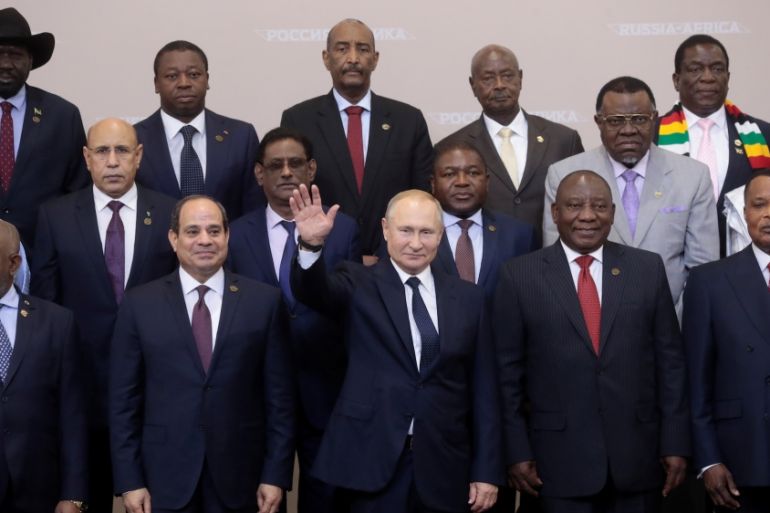Russia has joined the ‘scramble’ for Africa
Russia seeks ‘low-cost, high-profile’ opportunities on the African continent to burnish its prestige.

It used to be that the only time one would see African leaders huddled together in large numbers was at the annual gatherings of what used to be known as the Organization of African Unity and later rebranded as the African Union.
Today, however, one is also likely to encounter them in a few capitals outside the continent. Over the last five years, there have been such gatherings of leaders from nearly all 54 African countries in Washington in August 2014, in Beijing in July 2018 and most recently in Moscow last month.
These summits have been seen in the context of a new “scramble” for the continent, primarily pitting a growing, more confident and resource-hungry China against the West, which sees it as a threat to its global hegemony. However, what the role and ambition of Russia is, has been less clear.
Though during the Cold War, Moscow was a significant player on the continent, its interest in Africa was tangential at best, ultimately tied to maintaining its global prestige as a superpower and limiting the influence of its rivals, China and the United States. Africa offered the prospect of “maximum gains for winning world influence with minimum risk”.
Initially, under Joseph Stalin‘s rule in the 1930s and 1940s, the continent was almost completely ignored. But following his death, Soviet influence in Africa gradually accelerated, beginning with Egypt in 1954 and reaching its heyday in the 1970s when together with its Cuban and East-German allies, it succeeded in projecting itself as a real force in African affairs.
The Soviet-led Eastern bloc provided economic and technical aid as well as valuable security and political support to friendly African governments facing both internal and external threats. It was also one of the main suppliers of weapons to the continent.
Moscow’s ally Cuba sent expeditionary forces to fight in Angola and Ethiopia; the Soviets provided security guarantees to the front-line states bordering apartheid South Africa; East Germans organised and dominated secret police forces across the continent.
One commentator in the late 1980s noted that “through such instruments Moscow has virtually eliminated the prospect of pro-Soviet African regimes being removed by force. In a region characterised by coups, it is remarkable that no regime afforded Soviet, Cuban, and East German protection has succumbed to one.”
With the fall of the Berlin Wall, and the subsequent demise of the Soviet Union, whatever attraction Africa felt for its Marxist-Leninist ideology has largely dissipated. Further, in the last three decades, Russia has mostly retreated from its continental adventures and seemed more concerned about events at home and closer to its borders.
However, as it seeks to reassert itself on the world stage, Africa is still seen as providing “low-cost, high-profile” opportunities to burnish its prestige.
Still, the Africa of today is very different from that of the 1970s and 1980s and while maintaining some of the tactics that were successful in yesteryears, such as the use of proxy forces in places like the Central African Republic and the sale of light and heavy weapons to regimes with dubious human rights records, Russia has evolved others more in tune with the times.
According to Proekt (The Project), an independent Moscow-based online investigative news outlet, Kremlin-linked teams have used social media “troll farms” and spin doctors to interfere in politics and elections in 20 countries on the continent, particularly in Francophone Africa, but with mixed success so far. In 2018 they failed in their attempt to engineer the re-election of President Erie Radzaunarimampianina in Madagascar and have been linked to interference in elections in Zimbabwe.
According to the Financial Times “across Africa, Moscow has deployed teams of military instructors to train elite presidential guards, sent arms shipments and assisted shaky autocrats with election strategies. It has also promised to build nuclear power plants and develop oil wells and diamond mines.”
The Guardian has also reported on leaked documents showing a wide-scale Russian effort “to bolster its presence in at least 13 countries across Africa by building relations with existing rulers, striking military deals, and grooming a new generation of ‘leaders’ and undercover ‘agents’.”
The goal of Russian efforts seems largely unchanged from the Soviet days – essentially to counter and limit the influence of others on the continent. The benefits for autocrats seeking to hang on to power on the continent is similarly easy to ascertain. However, for their youthful subjects, many of whom have little experience or recollection of the Soviet Union, the renewed Russian interest is likely to be viewed with scepticism.
Aligning itself with autocrats and offering nuclear power plants will do little to bolster confidence in its intentions among people already chafing under Chinese debt for similar infrastructure and “development” projects.
Further, Russia’s record of election interference both in Africa and in the West is unlikely to go down well on a continent with the world’s highest internet penetration growth rates and where social media is increasingly set to influence politics.
The pictures of African delegates toying with Russian weapons will do little to convince a new generation that Russia is looking to engage Africa’s people rather than just their rulers.
The views expressed in this article are the author’s own and do not necessarily reflect Al Jazeera’s editorial stance.
